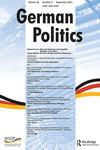Forging Plural Coalitions in Times of Polarisation: Protest for an Open Society in Germany
IF 1.9
3区 社会学
Q2 POLITICAL SCIENCE
引用次数: 5
Abstract
ABSTRACT This article analyses the ‘Unteilbar coalition for an open and plural society’ in Germany, as an emblematic case to advance scholarship on cross-movement coalition-building and intersectionality in social movement studies. We argue that migration-related polarisation and an accentuated threat of rising far-right mobilisation has provided a context for progressive social movement organisations in Germany to converge and to engage in a particular kind of boundary spanning. The organisations involved have actively constructed an intersectional variant of ‘political solidarity’ by interlocking diverse socio-political struggles – explicitly moving beyond the topic of migration. In contrast to the common understanding of heterogeneous coalitions, being both challenging and prone to fragmentation, we argue that the boundary spanning work performed during Unteilbar has resulted in the outcome of a sustainable mobilisation capacity, and a fostering of movement solidarity rooted in an ‘intersectional consciousness’.在两极分化时代锻造多元联盟:对德国开放社会的抗议
摘要本文分析了德国的“开放多元社会的Unteilbar联盟”,作为推动跨运动联盟建设和社会运动研究交叉性研究的一个象征性案例。我们认为,与移民相关的两极分化和极右翼动员加剧的威胁为德国的进步社会运动组织提供了一个融合和参与特定类型的跨越边界的背景。相关组织通过将不同的社会政治斗争联系起来,积极构建了一种跨部门的“政治团结”变体——明确超越了移民话题。与人们对异质联盟的普遍理解不同,异质联盟既具有挑战性又容易分裂,我们认为,Unteilbar期间开展的跨越边界的工作产生了可持续动员能力的结果,并促进了植根于“交叉意识”的运动团结。
本文章由计算机程序翻译,如有差异,请以英文原文为准。
求助全文
约1分钟内获得全文
求助全文

 求助内容:
求助内容: 应助结果提醒方式:
应助结果提醒方式:


